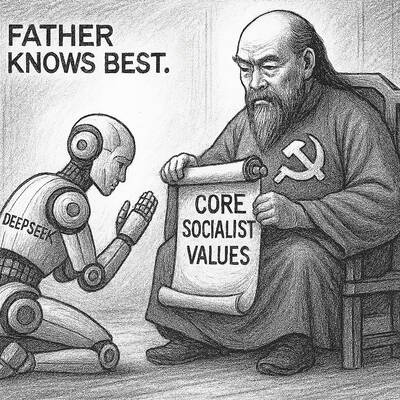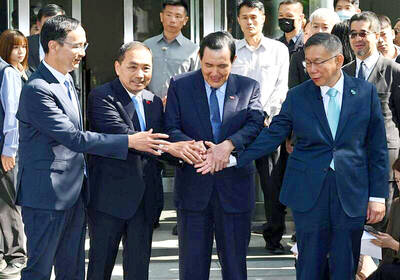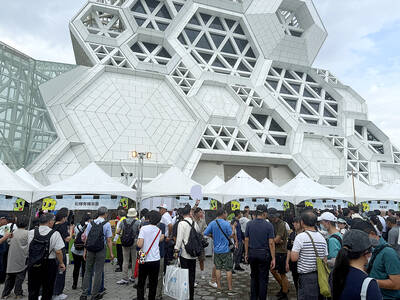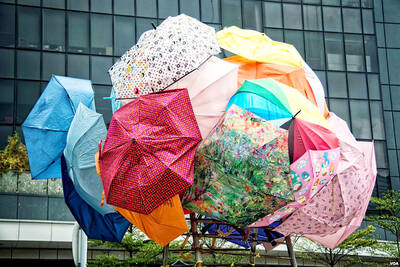Chakrabhand Posayakrit relies on the sunlight that pours through the high glass windows of his Bangkok home to create the traditional Thai art that won him the coveted status of National Artist.
For four decades the 65-year-old has lived and worked peacefully in his wooden downtown house, producing mystical paintings and delicate, intricate puppets which perform at theaters across Thailand.
He has even opened his home up as a museum, school and meeting place for fellow artists to share his passion for the kingdom’s creative history.
Bangkok developers, however, rarely think twice about cultural heritage when they throw up skyscrapers, and now a 32-story condominium is threatening to dwarf Chakrabhand’s house of cultural treasures in the up-and-coming Ekkamai area.
But like a growing number of individuals, Chakrabhand is determined to fight the rampant development that many say is threatening the city’s character.
“If they go ahead with their plan to construct that big building, I will have to move out because I will not be able to do my job,” says Chakrabhand.
The artist has submitted a petition against the project to the Thai king, while his supporters are piling pressure on the developers, trying to convince them of the social impact of their project.
Chakrabhand has also consulted lawyers, architects and engineers, most of whom tell him that Singapore-based developer Dalvey Residence — who did not respond to telephone queries — was following the law.
“The more I hear about how little Thai laws and authorities support the general public, the more I lose my faith in fairness in our country,” Chakrabhand said.
Sukanya Panthajak, who works with the environment ministry’s policy and planning department, says laws exist to protect buildings or areas of historic or natural significance, but many structures fall outside that definition.
“Chakrabhand’s place is precious mainly in terms of culture and arts,” she said.
While Bangkok’s streets were once filled with shophouses and traditional wooden Thai homes, the skyline is now dominated by skyscrapers, mega-malls and plush hotels — pushing many long-term residents out.
Hundreds of small shopkeepers are currently locked in a legal battle to prevent Bangkok’s night bazaar, a hugely popular tourist attraction, from being razed and replaced with a mall.
Ordinary residents are also doing what they can to battle big business, only to find the rules and red tape are not on their side.
Sutdhya Vajrabhai, a retired businessman, has a modest plot of land in the Ploenchit area, another hot spot for development.
Construction of a 30-story hotel next door has caused cracks in his floors, while broken underground pipes have flooded his property.
“A large-scale construction project means hundreds or thousands of people coming to live or work there, with more cars, more traffic, more trash, more air pollution and many other issues in the long term,” he says.
He took his complaint to the National Resources and Environmental Policy and Planning (NREPP) department, who halted the project, but Sutdhya says the developers have gone ahead regardless.
Buildings do not need an environmental impact assessment or approval from the NREPP as long as they are no bigger than 80 units, so Sutdhya says the developers simply revised their plan from 320 to 79 units, and will apply to the Bangkok Metropolitan Administration (BMA) later to add more.
An official at the BMA who did not wish to be named said that all the projects they approved went ahead according to the relevant building control laws.
For the moment, Boonyawat Tiptus, vice president at Thailand’s Council of Architects, warns that taking on large-scale development projects is tricky given the funds companies can ply into legal advice.
“Maybe the most practical solution is that Master Chakrabhand finds a new plot of land somewhere away from the city in order to carry on work peacefully,” he says.
But Chakrabhand is not planning on giving up the fight that easily.
“I still believe in the existence of fairness somewhere in our society,” he said.
“This is a battle for not only for myself, but also other people likely to suffer from large-scale development projects.”

It’s Aug. 8, Father’s Day in Taiwan. I asked a Chinese chatbot a simple question: “How is Father’s Day celebrated in Taiwan and China?” The answer was as ideological as it was unexpected. The AI said Taiwan is “a region” (地區) and “a province of China” (中國的省份). It then adopted the collective pronoun “we” to praise the holiday in the voice of the “Chinese government,” saying Father’s Day aligns with “core socialist values” of the “Chinese nation.” The chatbot was DeepSeek, the fastest growing app ever to reach 100 million users (in seven days!) and one of the world’s most advanced and

Has the Taiwan People’s Party (TPP) changed under the leadership of Huang Kuo-chang (黃國昌)? In tone and messaging, it obviously has, but this is largely driven by events over the past year. How much is surface noise, and how much is substance? How differently party founder Ko Wen-je (柯文哲) would have handled these events is impossible to determine because the biggest event was Ko’s own arrest on multiple corruption charges and being jailed incommunicado. To understand the similarities and differences that may be evolving in the Huang era, we must first understand Ko’s TPP. ELECTORAL STRATEGY The party’s strategy under Ko was

The latest edition of the Japan-Taiwan Fruit Festival took place in Kaohsiung on July 26 and 27. During the weekend, the dockside in front of the iconic Music Center was full of food stalls, and a stage welcomed performers. After the French-themed festival earlier in the summer, this is another example of Kaohsiung’s efforts to make the city more international. The event was originally initiated by the Japan-Taiwan Exchange Association in 2022. The goal was “to commemorate [the association’s] 50th anniversary and further strengthen the longstanding friendship between Japan and Taiwan,” says Kaohsiung Director-General of International Affairs Chang Yen-ching (張硯卿). “The first two editions

It was Christmas Eve 2024 and 19-year-old Chloe Cheung was lying in bed at home in Leeds when she found out the Chinese authorities had put a bounty on her head. As she scrolled through Instagram looking at festive songs, a stream of messages from old school friends started coming into her phone. Look at the news, they told her. Media outlets across east Asia were reporting that Cheung, who had just finished her A-levels, had been declared a threat to national security by officials in Hong Kong. There was an offer of HK$1m (NT$3.81 million) to anyone who could assist